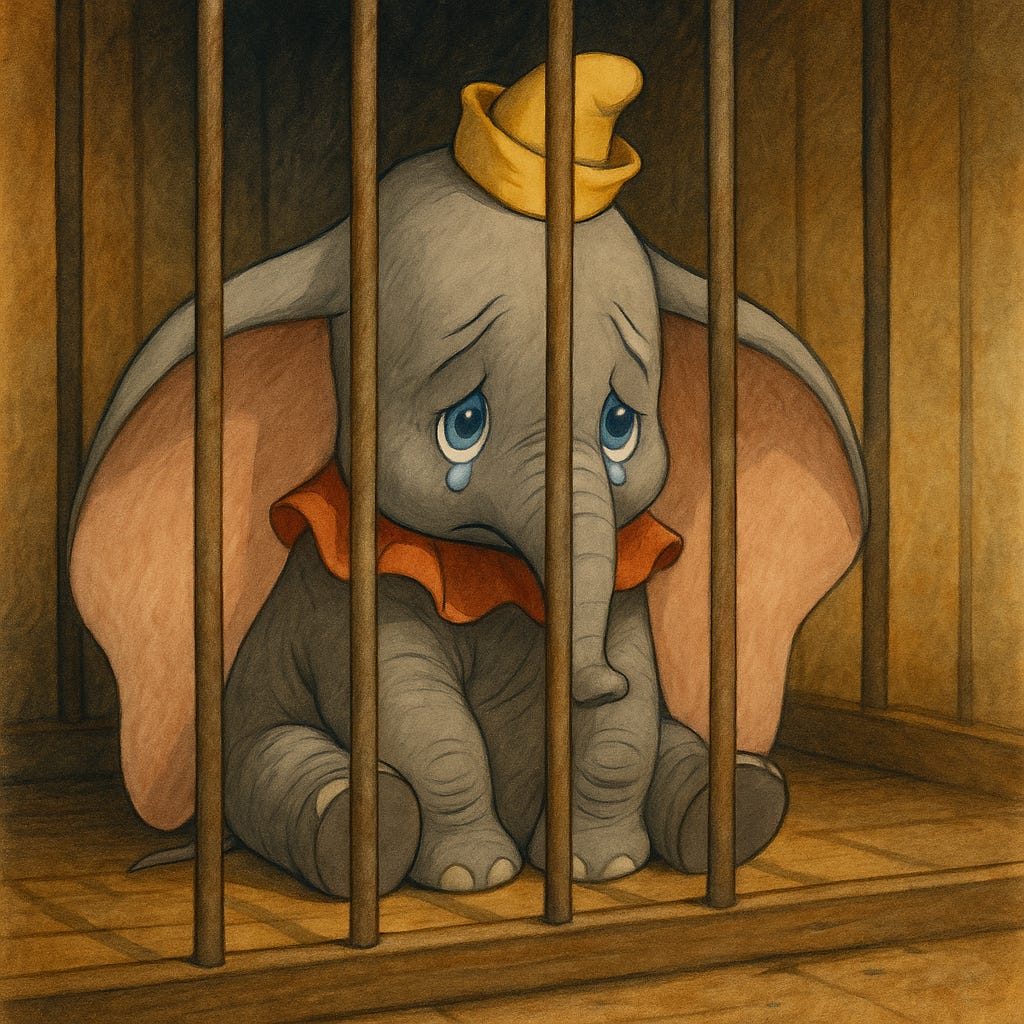DUMBO UNCHAINED — Fable Version
A Fable for the Fearful Age
DUMBO UNCHAINED
A Fable for the Fearful Age
By Jim Reynolds | www.reynolds.com
Author’s Note
Every so often I like to wander outside the essay form and into story. This time I’ve brought back one of my favorite characters from childhood—Dumbo, the flying circus elephant—but not as we remember him.
In this fable, he returns in a different world and a different time, carrying the same heart that once defied gravity. The circus is older, the rules stricter, and the air a little harder to trust—but flight, as always, finds a way.
I’ve written Dumbo Unchained in the orbit of storytelling rather than argument, letting imagination do the work that essays sometimes can’t. I hope you enjoy this little rebellion of wings and wonder.
— Jim Reynolds
——
The circus used to sparkle — light and laughter woven into sawdust and brass.
Then one day, the Reformation Committee arrived with clipboards and smiles sharp enough to cut rope. They renamed the place The Equity Emporium. Every act was reviewed for “balance.”
The fat lady became “the gravitationally gifted woman of size.”
The lion tamer was reassigned to lion dialogue training.
And Dumbo — poor, miraculous Dumbo — was grounded. No longer “special,” he was reclassified as “disproportionately enabled.” A sign hung over his pen:
“No Flying Without Consensus.”
⸻
Bob swept the sawdust between shows, a loyal employee with a broom and a conscience. He’d been with the circus since it mattered. He clearly recalled that magical evening when Dumbo flew across the big top and clowns scattered like falling bowling pins.
The crowds still came, but mostly out of habit. They sat politely through lectures on fairness while the calliope played a single note — C-flat, endlessly, the official sound of equality. Monotony became the sound of safety.
“Used to be,” Bob muttered, “the only thing heavier than Dumbo was the silence that followed him up.”
He remembered the old ringmaster — half mad, half magician — who knew that delight was dangerous but necessary. The new one wore a lanyard and said words like stakeholder.
⸻
During another lull in a lullful program, something changed.
A single caw split the still air. Then another. Then a raucous chorus.
A flock of crows stormed the big top like black laughter. They dropped peanuts and dogs-on-a-stick onto the crowd. One bird dive-bombed a bureaucrat; another perched on the safety sign and whistled Dixie while uncannily munching on a cigar.
At first no one moved. Joy, after all, was unscheduled.
Then a child giggled. Someone clapped. Laughter rippled through the seats like water breaking through a dam. For the first time in years, the tent sounded human.
⸻
The ringmaster didn’t appreciate it. He reached beneath his podium and drew out a shotgun — gleaming, old-world, and ceremonial. The crowd went still. The crows froze, eyes bulging in perfect cartoon terror — as if realizing, for the first time, they were part of the act.
That’s when Dumbo’s ears twitched.
He’d been watching. Waiting.
The moment that barrel caught the light, something ancient awoke inside him.
He trumpeted once — a deep, furious sound that rattled the rafters and canvas — and ran.
The Committee shouted, “Noncompliance!”
Bob dropped his broom, placed his hands on hips, leaned back and bellowed, “Fly, you magnificent outlaw!”
Dumbo leapt. The air caught him like an old friend. He soared straight toward the gun. The ringmaster fired — missed — and the recoil knocked him backward into his own paperwork, a blizzard of forms marked Approved.
The crows whooped and followed him upward, swirling in his wake. Popcorn flew. Soft drinks spilled. Kids screamed in sheer delight. Even the gossiping elephants forgot to tut and began trumpeting along.
⸻
When the smoke cleared, the tent was half-collapsed and wholly alive.
Dumbo circled once, twice, then rose through the rip in the roof, ears glowing like lanterns. The crowd poured out after him, laughing, crying, clapping with both hands again.
By dawn, the circus was gone. Only Bob remained, sweeping up feathers and ticket stubs.
He found one feather different from the rest — long, black, and perfect, still warm from flight. He turned it in his hand like proof that faith leaves fingerprints.
A poster flapped beside him:
“Joy Must Be Authorized.”
Bob dipped his broom handle in leftover paint and scrawled beneath it:
“Let the crows sing again.”
He planted the feather in the wet paint like a signature.
Then he smiled.
Some say the circus never reopened.
Others say it simply learned to fly.




George, you will love it! The recipe is so simple that even you can follow it! Jim
Brilliant!